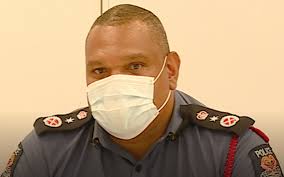Papua New Guinea could have received Covid-19 vaccines before its current crisis if Australia had not been part of a group of countries that blocked a proposal to free up access to Covid-19 medicines, say Médecins Sans Frontières Australia.
“There’s no doubt [if] the intellectual property waiver had been hastened and scaled at an earlier time there was a higher probability that Papua New Guinea would have been able to get vaccines [by now],” Jennifer Tierney, Executive Director of Médecins Sans Frontières (MSF) Australia said.
Scott Morrison announced on Wednesday that Australia would send 8,000 doses of the Covid-19 vaccine to Papua New Guinea, which has seen cases of the virus increase dramatically in the last month.
Australia’s closest neighbour has 500 doctors and 4,000 nurses to protect a population of more than nine million from the pandemic. Hospitals have already been forced to close their doors to patients as health workers have had to stay home after testing positive.
Prior to Morrison’s announcement, Papua New Guinea was not expecting the doses it has sourced – including 200,000 AstraZeneca doses from Australia, and 70,000 from India – until April.
However, Papua New Guinea, and other Pacific nations could have received its doses of the vaccine earlier, and have a rollout already under way, if Australia and other countries had not blocked an intellectual property waiver related to Covid vaccines, says MSF.
“The intellectual property waiver proposal was first made to the WTO by India and South Africa in October last year. Australia was one of the countries opposing this from the start,” said Tierney.
“Add to that the fact that wealthy countries, including Australia, representing only 13% of the global population had already locked up at least half of the world’s leading potential Covid-19 vaccines, through pre-purchase deals with pharmaceutical companies.”
India, a leading producer of cheap, generic medicines for the developing world, has spear-headed the proposal for a temporary waiver of intellectual property rights at the World Trade Organization, alongside South Africa.
The waiver was back by more than 100 countries, including countries in the Pacific region, as well as civil society groups, who supported the successful campaign for a similar waiver at the height of the HIV and Aids pandemic in 2001. Last Thursday, Australia joined other developed countries in blocking it in a World Trade Organisation(WTO) committee that relies on consensus
Fran Baum, co-chair of The People’s Health Movement and professor of public health at Flinders University, Adelaide, told the Guardian the intellectual property waiver was “essential, not just on moral grounds, but also on public health grounds.”
Last week, Australia’s trade minister Dan Tehan told ABC Radio “we’ve got to make sure that there are some protections in place for the millions of dollars that has gone into the research to create these vaccines”.
The day after Australia blocked the waiver, it announced that alongside the Quad – a new informal grouping of Australia, the US, India and Japan – that Australia would commit $100m(US$78 million) to help send vaccines to Asian and Pacific island countries by the end of 2022.
However, both Tierney and Baum said that Australia should not see providing vaccines through the Covax programme as a replacement for helping to free up intellectual property for the vaccine.
Tierney said that the doses the Pacific will receive may well still be through the Covax facility but that an intellectual property waiver would have meant that Covax would have had “access to more resources to be able to satisfy the need.”
Opponents of the proposal claim that a temporary waiver of intellectual property rights would discourage investment in medical research and development, despite the fact that most of the money invested in the Covid-19 vaccines came from governments not the corporations that now hold vaccine monopolies. An unprecedented amount of public funds, estimated at over $5bn(US$3.9 billion) has been poured into Covid-19 vaccine research.
“A lot of the money for developing the vaccines was actually public money, it wasn’t private money. So that, to me increases the moral case that the IP should be waived, for the public good,” said Baum.
SOURCE: THE GUARDIAN/PACNEWS














